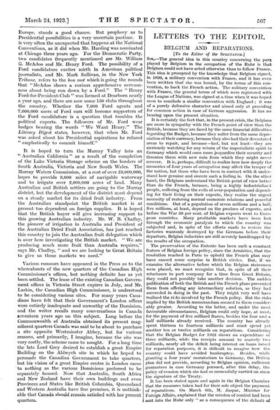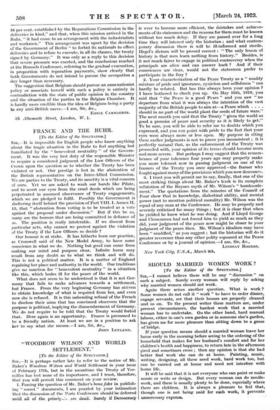LETTERS TO THE EDITOR.
BELGIUM AND REPARATIONS.
[To the Editor of the SPECTATOR.] Sza,—The general idea in this country concerning the part played by Belgium in the occupation of the Ruhr is that Belgium could not have acted otherwise than to follow France. This idea is prompted by the knowledge that Belgium signed, in 1920, a military convention with France, and it has even been written that she was bound, by the terms of this con- vention, to back the French action. The military convention with France, the general terms of which were registered with the League of Nations, was signed at a time when it was hoped soon to conclude a similar convention with England ; it was of a purely defensive character and aimed only at providing for common action in case of German aggression. It has no bearing upon the present situation.
It is certainly the fact that, in the present crisis, the Belgians are more in sympathy with the French point of view than the British, because they are faced by the same financial difficulties regarding the Budget, because they suffer from the same depre- ciation of their currency, because they also had their devastated areas to repair, and because—last, but not least—they are anxiously watching for any return of the imperialistic spirit in Germany which would once more jeopardize their security and threaten them with new ruin from which they might never recover. It is, perhaps, difficult to realize here how deeply the memories of four years of occupation may affect the temper of the nation, but those who have been in contact with it under- stand how genuine and sincere such a feeling is. On the other hand, the Belgians understand the British point of view better than do the French, because, being a highly industrialized people, suffering from the evils of over-population and depend- ing for their living on their exports, they realize the urgent necessity of restoring normal economic relations and peaceful conditions. Out of a population of seven millions and a half, five millions, at least, depend on the produce of exports, and before the War 30 per cent. of Belgian exports went to Euro- pean countries. Many profitable markets have been lost through the economic paralysis to which the country was subjected and, in spite of the efforts made to restore the factories wantonly destroyed by the Germans before their departure, Belgian industries are still severely handicapped by the results of the occupation.
The preservation of the Entente has been such a constant feature of Belgian foreign policy, since the Armistice, that the resolution reached in Paris to uphold the French plan may have caused some surprise in British circles. But, if we examine the alternative before which the Belgian statesmen were placed, we must recognize that, in spite of all their reluctance to part company for a time from Great Britain, they could not possibly take another decision. The sudden publication of both the British and the French plans prevented them from offering any intermediary solution, as they had succeeded in doing in the past. They might very well have realized the risks involved by the French policy. But the risks implied by the British memorandum seemed to them consider- ably greater. According to the latter, and under the most favourable circumstances, Belgium could only hope, at most, for the payment of five milliard francs, besides the four and a half milliards already received. The country has already spent thirteen to fourteen milliards and must spend yet another ten or twelve milliards on reparations. Considering that the Belgian Budget for 1922 shows an expenditure of three milliards, while the receipts amount to scarcely two milliards, nearly all the deficit being interest on loans raised for reparation purposes, it is difficult to imagine how the country could have avoided bankruptcy. Besides, while granting a four years' moratorium to Germany, the British plan did not provide, according to Belgian opinion, sufficient guarantees in case Germany pursued, after this delay, the policy of evasion which she had so successfully carried on since the signature of the Treaty.
It has been stated again and again in the Belgian Chamber that the measures taken had for their sole object the payment of reparations. On March 6th, M. Jaspar, Minister for Foreign Affairs, explained that the mission of control had been sent into the Ruhr only " as a consequence of the default of
16 per cent. established by the Reparations Commission in the deliveries in kind," and that, when. this mission arrived in the Ruhr, " it had come to an arrangement with the industrialists and workmen." This arrangement was upset by the decision of the Government of Berlin " to forbid its nationals to effect deliveries and to refuse to execute, in all its clauses, the treaty signed by Germany." It was only as a reply to this decision that severe pressure was exerted, and the conclusions reached at the Brussels Conference, referring to the gradual evacuation, in proportion with reparation payments, show clearly that both Governments do not intend to pursue the occupation a day longer than necessary.
The suggestion that Belgium should pursue an annexationist policy or associate herself with such a policy is entirely in contradiction with the state of public opinion in the country and the situation of the parties in the Belgian Chamber. It is hardly more credible than the idea of Belgium being a party to any anti-British move.—I am, Sir, &e., EMILE CAMMAERTS. 35 Albemarle Street, London, W. 1.



































































 Previous page
Previous page